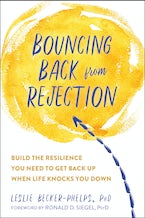By Leslie Becker-Phelps, PhD, author of Bouncing Back from Rejection
If you tend to struggle with feeling rejected or like you don’t matter, chances are that this issue has been especially difficult during lockdown—when relationships with people you live with are likely to become strained. You may find that your feelings of distress overpower you, causing you to dig yourself more deeply into self-critical thoughts and feelings of inadequacy. You may be sure that you deserve to be avoided, abandoned, or rejected. But these reactions are more emotional than “objectively real.” With some time, you can calm down and reflect on the situation and yourself with greater clarity.
I offer an exercise in my book, Bouncing Back from Rejection, that guides you in reflecting on your thoughts and feelings about yourself. This “Explore Your Thinking” exercise can be completed with just a paper and pencil, or you can download a worksheet to complete. (The download also offers an example.) If you decide not to use the worksheet, copy the chart below on a full sheet of paper, making sure to give enough space in each cell to fill it out fully:
| Situation: | |||
| Focus | Immediate Thoughts | Reflections on Thoughts | Feelings |
| Me | |||
| Others | |||
| Situation |
Now, complete the downloaded or copied chart:
Label the situation. In the “Situation” cell, write a sentence to explain a situation that causes you to struggle with rejection. You will be reflecting upon this.
Complete the “Immediate Thoughts” column. In the appropriate rows, answer the question, “What are your immediate thoughts about yourself, others, and the situation?”
Complete the “Reflection on Thoughts” column. In the appropriate rows, answer the question, “Objectively speaking, how accurate are your thoughts?” (Remember that even if they are not accurate, you might still believe them. People’s beliefs are often based on their emotional experience, not their intellectual assessments.)
To help you assess the accuracy of your thoughts, you might consider these questions:
- What evidence supports these thoughts or beliefs?
- Are there times when they are not true? (Even one example of it not holding true shows that it is not absolutely true.)
- Regarding any harsh judgments about yourself or others, are there kinder ways to understand you or them that account for all of the other person’s experiences or “facts?”
- Are there ways of looking at the situation that could encourage greater empathy or compassion?
People who struggle with judging themselves harshly sometimes find it helpful to consider how a good friend might think about them, or how they would think about someone else in their position.
Complete the “Feelings” column. In the appropriate row, answer the question, “What am I feeling?” Consider how much your thoughts might be more a statement of how you feel than how you intellectually assess yourself, others, and your situation. If you find this difficult, fill it out the best that you can. You might find it helpful to look at this List of Emotions.
**
Working through this exercise can help you to step out of your emotions surrounding lockdown, and gain more perspective on your reactions. Also, practicing it with different situations can strengthen and reinforce this ability. Eventually, you may find that this perspective comes more quickly and easily. It can help you remain calmer and respond in a more self-compassionate and supportive way to feeling disrespected, dismissed, or abandoned—now and long after the lockdown has been lifted.
If you would like to learn more about this topic, check out this brief video.
Leslie Becker-Phelps, PhD, is an internationally published author, speaker, and psychologist. She is a trusted expert on relationship issues that people have with themselves, as well as with others. She is author of Bouncing Back from Rejection and Insecure in Love. She writes the blogs Making Change for www.psychologytoday.com, and Relationships for www.webmd.com; and is the relationship expert for WebMD’s Relationships message board. In addition, she has created a library of short videos on her YouTube channel to offer people the opportunity to learn how to feel better about themselves and their lives. Becker-Phelps has a private practice in Basking Ridge, NJ; and is on the medical staff of Robert Wood Johnson University Hospital Somerset, where she previously served as clinical director of women’s psychological services, and chief of psychology in the department of psychiatry. She lives with her husband and two sons in Basking Ridge. Find out more about her at www.drbecker-phelps.com.



 2024 Peace Playbook: 3 Tactics to Avoid Clashes with Your Partner
2024 Peace Playbook: 3 Tactics to Avoid Clashes with Your Partner